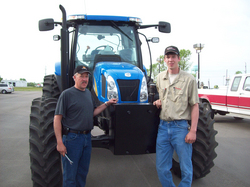| In the photograph, Dave Volker (left), tractor operator from the Polk County Highway Department, and Junior Thomas Haarstick (right) stand by the tractor modified to run on straight vegetable oil. |
"The tractor operates using a two-tank system," explains Aakre. The tractor starts on diesel fuel and a switch is made to the vegetable oil when the operating temperature is high enough and the exhaust temperature is hot enough on the tractor."
A conversion unit from the German company, Elsbett AG, was attached to a New Holland tractor this spring in order for it to use the vegetable oil as fuel. A tank on the front of the tractor holds the necessary diesel fuel for starting and then a switch is made either automatically or manually to the SVO in the tractor's main fuel tank.
The SVO, a byproduct of crushing canola seed, is filtered for use in the tractor. Since the SVO has a higher viscosity than diesel fuel, a heat exchanger is used to heat the oil to improve its fluidity. The Environmental Protection Agency provided an exemption to test the SVO in the tractor.
Haarstick, an agricultural systems management major, worked on mounting the conversion unit, preparing the tractor, and doing much of the electrical work. His student research is funded in part by an undergraduate research grant he applied for with Aakre. "Being involved in SVO research has shown me that hard work will pay off," Haarstick says. "I know there will be benefits working on research that only a select few are attempting."
Using a locally produced product and saving fossil fuel are just two of the benefits of running a tractor on SVO. The project is part of ongoing research by Aakre using vegetable oil as fuel. He worked with Jade Estling, a 2009 graduate of the U of M, Crookston, on setting up a small scale bio-diesel lab in 2007.
Support for the project came in part from the Northwest Regional Sustainable Development Partnership (NWRSDP). The NWRSDP serves northwest Minnesota and works to foster development of agricultural, tourism and natural resources systems that are profitable for citizens, while enhancing environmental quality and supporting rural communities. The Clean Energy Resource Teams (CERTs) are a joint program of the University of Minnesota's Regional Sustainable Development Partnerships, the Southwest Regional Development Commission, Green Institute, The Minnesota Project, and the Minnesota Office of Energy Security, Department of Commerce. CERTs works to connect people with the technical resources needed to identify and implement community-scale energy efficiency and renewable energy projects.
Today the University of Minnesota, Crookston delivers more than 25 applied-science undergraduate degree programs and 50 concentrations, including several online degrees, in agriculture; arts, humanities and social sciences; business; math, science and technology; and natural resources. To learn more, visit www.UMCrookston.edu.
Contact: Paul Aakre, assistant professor, 218-281-8104 (paakre@umn.edu); Elizabeth Tollefson, assistant director of communications, 218-281-8432 (ltollefs@umn.edu)


